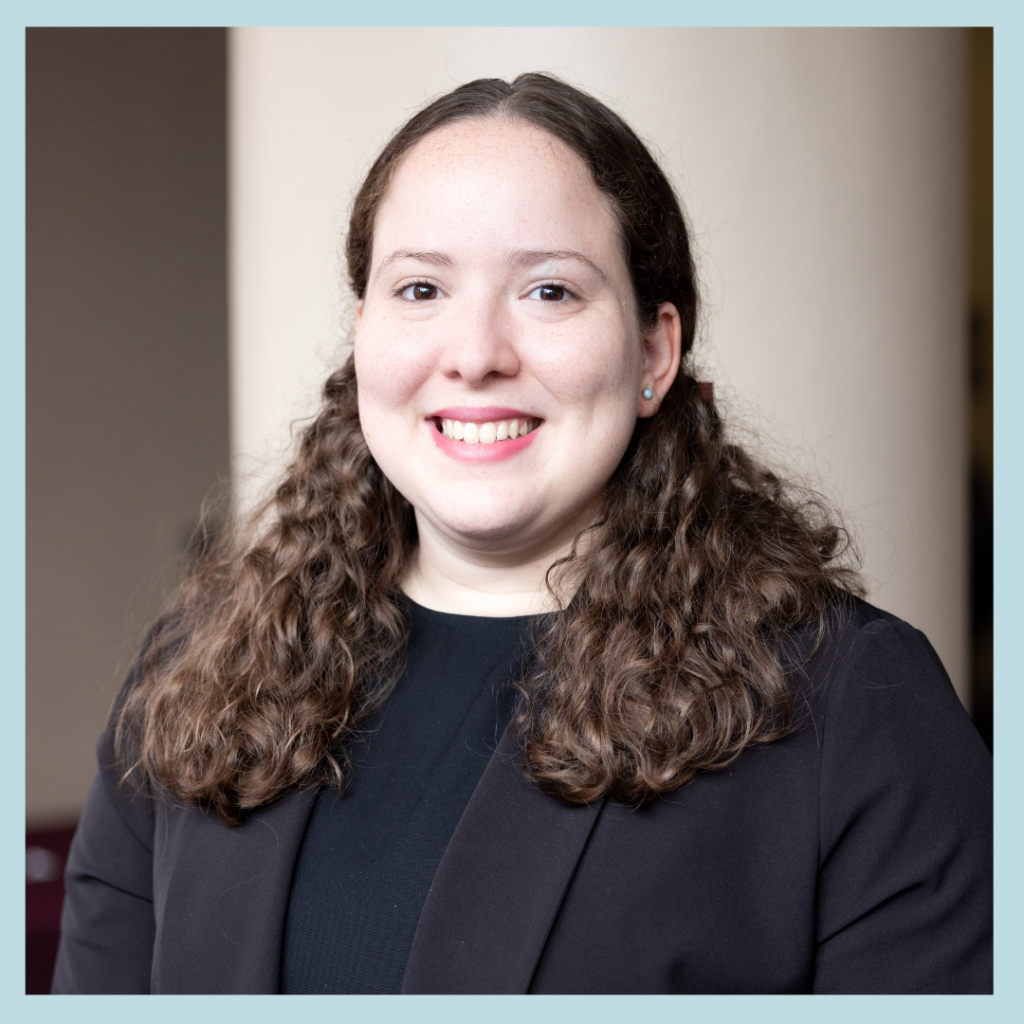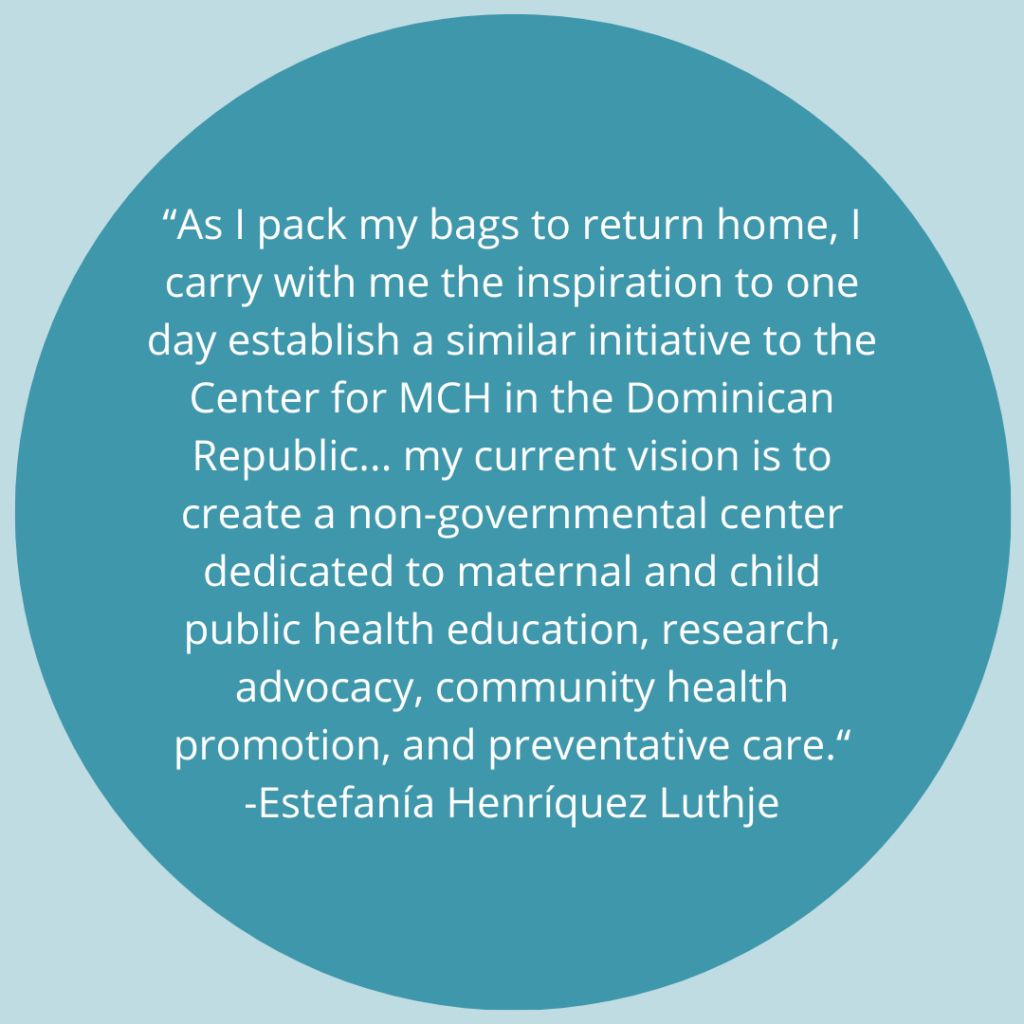Estefanía Henríquez Luthje (MPH 2024), a Fulbright Foreign Student at #UMNMCH, shares a personal reflection on her background as an M.D. in the Dominican Republic, experience managing the National MCH Trainee Blog (MCH Leads), and future hopes to establish a Center for MCH in the Dominican Republic.
The Road Less Traveled: My Journey to the UMN Maternal and Child Health Program
“The two babies died within 10 minutes, after 10 hours of taking turns between five fellow medical students that had to manually ventilate them. The babies’ families’ prolonged anxiety turned into a devastating cry when they were asked to go into the urgency room – not an intensive care unit due to space limitations – to say their last goodbyes. How could I explain to them that, in the crib right in front of them, was a third critically ill but living infant, with better chances of survival because earlier that Sunday it had been arbitrarily assigned to the only functioning mechanical ventilator in the hospital?” (Excerpt from my MPH application)
Experiencing situations like the one described above was an everyday occurrence during my final year of medical school back home in the Dominican Republic. In the summer of 2019, I had about six months until I would be completed with all the requirements for my M.D and was on the path to pursuing a pediatrics residency. At that moment, I began to recognize that I would never personally feel like I had done enough for my patients if I confined my work within the walls of hospitals marked by scarcity and suffering. Guided by that realization and holding fast to my long-held belief that every child deserves a healthy start in life, and that starting strong is the surest way to guarantee a thriving future, I took a leap of faith to pause the traditional residency route. Instead, I immersed myself in work, volunteer, and training experiences focused on upstream approaches – a road rarely traveled by health professionals in the Dominican Republic.
After being drawn to community health, education, and research since my high school years, as well as consistently sustaining those interests during every break from clinical training, I was surprised that I had never considered the possibility of pursuing a Master of Public Health (MPH). Looking back, it seems like the obvious career choice! In 2020, I completed an online clinical research certificate at Harvard T.H. Chan School of Public Health. The professional networks I established during that training led to my first official position in public health: a year-long research internship at the Program of Nutrition of the Ministry of Public Health. Subsequently, I was promoted to a permanent staff member, taking on the role of a research analyst. Having seized these opportunities within a two-year span after medical school, my commitment to pursuing an MPH became unwavering. Supported immensely by the Fulbright Foreign Student Program and the P.E.O. Sisterhood’s International Peace Scholarship, I packed my bags and traveled over 2,000 miles to start my Maternal and Child Health (MCH) MPH training at the University of Minnesota (UMN) School of Public Health in the fall of 2022. This program was recommended to me by my Fulbright advisors and quickly became dear to my heart after learning about the MCH program’s exceptional 70-year history and ties to global health work with Batey Relief Alliance (BRA) in the Dominican Republic. This felt like a perfect, full-circle opportunity because even while abroad, I would still be able to contribute to projects related to my home country through UMN’s global health partnership with BRA.
The MCH Leads Blog
In September 2022, alongside my academic responsibilities, I took on the roles of editor for the MCH Leads blog–the competency-based, student-led National MCH Trainee blog–and Communications and Marketing Lead for the MCH Student Interest Group (MCHSIG). The MCH Leads Blog, hosted by the Center for Leadership Education in Maternal and Child Public Health at UMN and the MCH Catalyst Program at the University at Albany, provides an outlet for MCH students nationwide, affiliated with HRSA-funded programs, to share their experiences and apply the 12 MCH Leadership Competencies to their work. Beyond offering a platform for students to reflect on their MCH journeys, the blog also serves to connect authors with others seeking their specific skillset by promoting the write-ups on LinkedIn and other social media platforms, as well as forwarding the articles to specific contacts as requested by the authors. Simultaneously, it inspires prospective MCH students by showcasing the depth and breadth of the field.
As an editor, I handle all stages of the publishing process. This includes reaching out to students and directors at HRSA-funded MCH Centers of Excellence and Catalyst programs for author recruitment. Once recruited, I guide students through the process of writing about their work. I am also responsible for tasks such as editing and publishing the articles, designing and updating the website, and creating communications pieces to promote the published blog posts. As I mentioned in the December 2022 MCH Leads feature, the editor role perfectly merges my interest in MCH with my creative abilities for content creation. Additionally, it aligns with my passion for helping students and professionals best showcase their accomplishments as a way to advance their professional goals.
As my time as an editor comes to an end, I am pleased to announce that we have completed recruitment to continue featuring articles until May 2024 and beyond. During these final months of my deployment, I look forward to understanding the blog’s impact in helping students advance academically and professionally. I plan to do this by collecting students’ experiences with writing and sharing their blog posts, as well as examining the reach their articles have achieved. Additionally, I will assess how these publications have been used to complement students’ portfolios. Moreover, documenting all the processes conducted over the past two years is a priority for me to ensure a smooth transition for the next blog editor.
The Impact of the Center on my Leadership Skills, Work Ethics, and Future Plans
One of the experiences that I treasure the most–one that has transformed me both personally and professionally–is being part of the team at the Center. Many day-to-day tasks and interactions, which may seem customary for many, were entirely new to me. This included being encouraged to carefully plan, organize, and prioritize work to eliminate the need to rush or improvise, as well as to document processes with step-by-step manuals to ensure smooth role continuation. Our team programmed recurrent meeting times for both one-on-one and group discussions on upcoming projects, but we also dedicated time to reflecting on completed projects, aiming to assess how processes could be improved in the future. These meetings always allowed enough time to discuss how we were all doing while balancing the many responsibilities that come with work, school, and life, supporting each other not just as colleagues but as individuals. This last aspect, recognizing each person beyond their work duties, is a key component of leadership that I learned during my deployment and one that I am committed to carrying on as I advance through other positions in my MCH career. I will be forever grateful for the unconditional support I received from Sara Benning and Dr. Zobeida Bonilla, as well as from my friends Kailee Schaberg and Cassie Mohawk. I met Kailee and Cassie through our work at the Center, and they have always been there for me through the highs and lows.
As I pack my bags to return home, I carry with me the inspiration to one day establish a similar initiative to the Center for MCH in the Dominican Republic. I am confident that the children, women, and families in my country will benefit from such a transcendent endeavor. My current vision is to create a non-governmental center dedicated to maternal and child public health education, research, advocacy, community health promotion, and preventative care. This center would prioritize training opportunities for healthcare providers and other professionals serving the maternal and child health population, with a focus on enhancing their capacity and contributing to the improvement of service quality. Additionally, it would encourage the adoption of more upstream approaches. The center would also facilitate research on crucial yet neglected topics such as mental health, parental leave, and maternal and child mortality. If this dream comes true, I envision the center becoming a reliable source of information for legislators and other decision-makers on critical issues. Most importantly, it would serve as a source of direct support for women, children, and their families.
I am confident that I will always have a group of MCH professionals willing to walk alongside me, whether in Minneapolis or Santo Domingo, to ensure that every child has a healthy start in life.
Estefanía Henríquez Luthje, M.D., (MPH 2024) is a second-year MCH MPH student. She earned her medical degree from Instituto Tecnológico de Santo Domingo.
Interested in learning more about getting a degree in MCH? Visit our MCH Program page for more information.
#UMNMCH #UMNproud #UMNdriven

